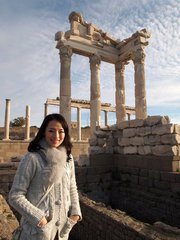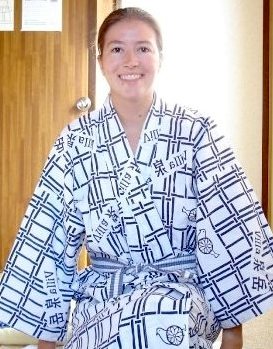Two Elon alumni are providing our community with their perspectives on the disasters in Japan and the effects on the people there. Amy Jo Jenkins '05 expressed her thoughts in a telephone interview and Asami Sudani '06 provided a written message via Facebook.
Jenkins did a phone interview with University Relations director Dan Anderson. Jenkins is aquatics director in U.S. Navy Morale, Welfare and Recreation efforts at the U.S. Navy base at Yokosuka, Japan. Yokosuka is in Kanagawa Prefecture, about 45 miles southeast of Tokyo.
During the past two years, Jenkins has overseen six pools on three bases, directing the swimming programs for sailors and their families. Jenkins lives off-base and supervises a large staff that includes many Japanese people. She says there is currently a voluntary evacuation of U.S. citizens from the naval base, but for now, she is planning to stay in Japan.
> Click here to listen to her interview.
Sudani is a native of Japan and lives in the Toyko area. She provided this message for the Elon community:
Yes, we were struck by the great earthquake, which was really terrifying even though Tokyo was only M 5. My office building was shaking really hard and I have never experienced that strong quake in my life. I cannot imagine how people in Tohoku Area felt when the earthquake hit them on 3/11.

These devastating disaster sites in Tohoku Area are heartbreaking…over 10,000 people have passed away and injured and over 100,000 houses were destroyed. I cannot believe this kind of things happened to my country, but we are also concerned about the next possible hit to Kanto Area where all the major cities are, including Tokyo.
Every time I watch TV about the disaster areas, it makes me heartbroken because these people are suffering from not having enough foods, water, electricity, toilets, and heating devices. Many of the populations in the areas are elderly people, so they need their daily medicines to maintain their health.
Other areas and oversea rescue teams are trying to bring foods and goods to the disaster areas; however, it has been challenging with highways and roads being badly damaged from the earthquake. Therefore, these disaster victims have been enduring hunger and coldness for almost a week.
We are still having aftershocks every day since Friday and accordingly to data, there were 240 aftershocks occurred as of 3/17.
Due to the nuclear power plants in Fukushima exploded and not being able to supply any electricity, Tokyo has been facing electricity shortage. Starting Monday, many of residential areas in Tokyo and Yokohama are subject to blackouts planned by Tokyo Electric Power Company. The blackouts affected many public transportation systems and they were forced to close the operations. Because of that, Tokyo was in chaos since people could not commute to work in the morning and also could not go home in the evening. The planned blackout has been continuing in limited areas even today, but all of the transportations seem to be operating fine today.
I live in Tokyo and my work place is located in Shinjuku. Every employee seems to be calmed down now and working normally, but every time we feel aftershocks, everyone freezes and tries to protect herself/himself. I think we all have become very sensitive about quakes and are afraid of the next big earthquake.
I have heard about news that many of countries, especially U.S., have been sending aids and collecting donations for the survivors. This shows that Japan has a strong bond with these countries and we are deeply thankful for the international friendships and assistance.
Thank you for your concern about Japan and keeping us in your thoughts. Please continue praying for these disaster victims and Japan.
Asami



